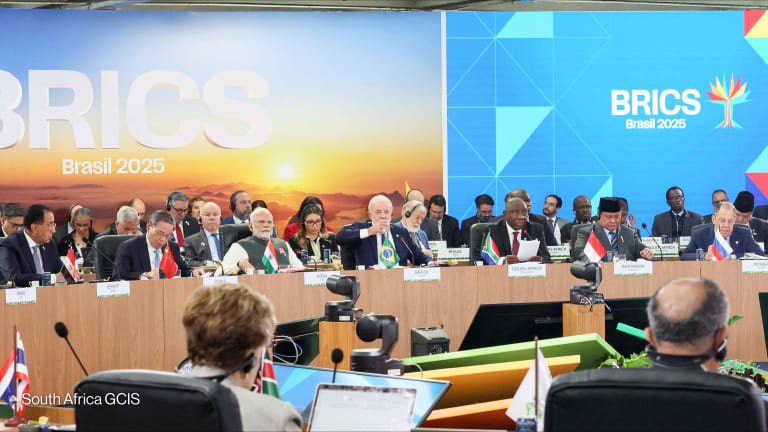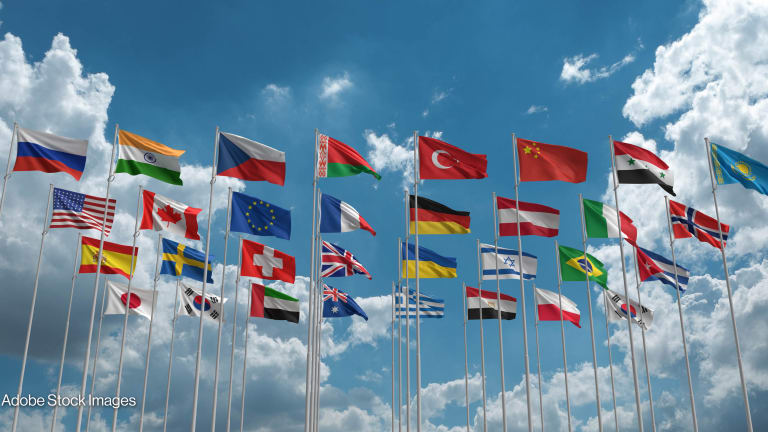Opinion: As the rules of global cooperation shift, here is plan B
Like-minded internationalism is emerging as an alternative to the post-1945 multilateral cooperation model.
The international landscape in mid-2025 is characterized by a retreat from liberal institutionalism, as seen by the U.S. withdrawal from the U.N. Sustainable Development Goals and its adoption of transactional, power-based international relations. This shift has profound implications for international cooperation, particularly in the fields of development, climate, and global public goods. In this shifting landscape, a new mode of cooperation is taking shape: like-minded internationalism. This approach champions flexible coalitions of countries and groups bound by shared values and interests — not by allegiance to formal multilateral structures or reliance on authoritarian leadership. In a world that is increasingly multipolar and unpredictable, like-minded internationalism may be one of the few credible responses still capable of delivering meaningful global development outcomes. A necessary shift in strategy When dominant powers begin to reject the rules and norms that once governed international engagement — which they shaped and led — the very foundations of diplomacy begin to erode. We are witnessing this right now — where coercion and transactionalism are overruling consensus and cooperation. Business as usual is no longer viable. Countries committed to shared goals must find new ways to collaborate. The breakdown of the post-1945 order — originally constructed under U.S. leadership and rooted in liberal ideals such as open markets, rule-based cooperation, and, to some extent, global solidarity — has accelerated by recent global shocks. The COVID-19 pandemic, escalating geopolitical tensions, and the resurgence of rivalry between powerful countries have all underscored the limitations of a global ambition for multilateralism. The Trump administration pulling out of Agenda 2030 and the SDGs is more than symbolic. It is a turning point away from the international consensus that once underwrote global development efforts. This vacuum demands a plan B: An alternative that avoids paralysis and provides practical avenues for progress. Like-minded internationalism: A pragmatic alternative At its core, like-minded internationalism means working with allies to take collective action. These groupings do not aim for universal consensus; instead, they seek common ground among the willing and the able. Their value lies in being nimble, mission-focused, and able to avoid the minimalist compromises that too often stall traditional diplomacy. This model is already working. Consider Unitaid, a global health initiative that addresses HIV/AIDS, malaria, and tuberculosis through innovative financing, such as a small levy on airline tickets, known as a “solidarity tax,” established by France and Brazil. Unitaid shows how countries can join forces and share resources to improve global health, even without full global agreement. Another case is the High Ambition Coalition, an alliance of countries that played a critical role in securing the 1.5 degrees Celsius target in the Paris Agreement. HAC showed that a shared sense of purpose and strategic diplomacy can produce outsized results — even on issues as complex and contentious as climate change. “Like-minded internationalism is rooted in pluralism, driven by pragmatism, and grounded in a commitment to deliver results.” --— These examples offer a blueprint: Success hinges on shared objectives, bold leadership, and the agility to act without waiting for global unanimity. Implications for global development When countries recognize mutual challenges and are prepared to act jointly, they can overcome classic collective-action barriers, such as free-riding or political gridlock. The rise of like-minded internationalism signals a subtle but profound shift. It suggests that purpose-driven coalitions can, in some cases, substitute broad but often inert universal multilateralism. This approach requires new thinking. Governments must move beyond traditional national identities and outdated policy. They must be willing to innovate, experiment, and learn from failure. And crucially, they must be bold, rejecting the passive role of “norm takers” in favor of becoming “norm makers” — setting the agenda rather than reacting to it. The Bridgetown Initiative is a relevant example, as it is led by Barbados and supported by a diverse group of countries to reform the global financial system so that developing nations can better access funding for climate action, debt relief, and sustainable development. This is not a retreat from multilateralism, but an adaptation to its current limitations. Like-minded internationalism is rooted in pluralism, driven by pragmatism, and grounded in a commitment to deliver results. For countries that still believe in cooperation — whether for climate justice, health equity, or sustainable development — it represents a vital path forward. As the old consensus fractures, the need for alternative frameworks grows more urgent. The future of global development may well depend on those willing to step up, find common cause, and act boldly — together. For a more detailed analysis, here is the full policy paper: “In Search of a Plan B: Like-Minded Internationalism and the Future of Global Development.”
The international landscape in mid-2025 is characterized by a retreat from liberal institutionalism, as seen by the U.S. withdrawal from the U.N. Sustainable Development Goals and its adoption of transactional, power-based international relations. This shift has profound implications for international cooperation, particularly in the fields of development, climate, and global public goods.
In this shifting landscape, a new mode of cooperation is taking shape: like-minded internationalism. This approach champions flexible coalitions of countries and groups bound by shared values and interests — not by allegiance to formal multilateral structures or reliance on authoritarian leadership.
In a world that is increasingly multipolar and unpredictable, like-minded internationalism may be one of the few credible responses still capable of delivering meaningful global development outcomes.
This article is free to read - just register or sign in
Access news, newsletters, events and more.
Join usSign inPrinting articles to share with others is a breach of our terms and conditions and copyright policy. Please use the sharing options on the left side of the article. Devex Pro members may share up to 10 articles per month using the Pro share tool ( ).
The views in this opinion piece do not necessarily reflect Devex's editorial views.
Len Ishmael is a former U.N. diplomat and ambassador to the EU, a professor of geopolitics at the Mohammed VI Polytechnic University in Morocco, and a senior fellow at the Policy Center for the New South and the German Marshall Fund. She is an international speaker and author on subjects related to the global south, BRICS, and evolving power dynamics in a multipolar world.
Dr. Stephan Klingebiel is head of inter- and transnational cooperation at IDOS. He holds academic roles in Seoul, Bonn, Turin, and India. He previously led the UNDP Global Policy Centre in Seoul and founded KfW's Kigali office. His work focuses on global governance, development policy, and international cooperation.
Andy Sumner is professor of international development at King’s College, London, and president of the European Association of Development Research and Training Institutes. He is also a senior fellow at the United Nations University, WIDER, Helsinki, and the Center for Global Development, Washington, D.C. His research focuses on questions of global inequality, economic development, and development cooperation.










